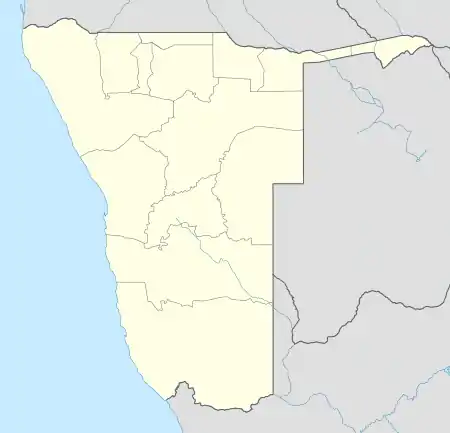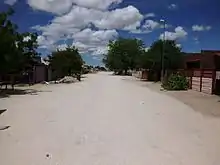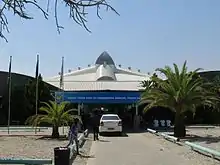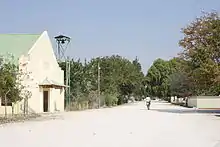Ongwediva
Ongwediva is a town in the Oshana Region in the north of Namibia. It is the district capital of the Ongwediva electoral constituency. As of 2010 it had 27,000 inhabitants and covered 4,102 hectares of land. Ongwediva has seven churches, two private schools and 13 government-run schools. Most of the inhabitants speak Oshiwambo.[3]
Ongwediva | |
|---|---|
Town | |
 Coat of arms | |
| Nickname(s): The Valley of the Leopard | |
| Motto(s): Freedom & Hard Work | |
 Ongwediva Location in Namibia | |
| Coordinates: 17°47′S 15°46′E | |
| Country | |
| Region | Oshana Region |
| constituency | Ongwediva Constituency |
| Proclaimed | 1992 |
| Government | |
| • Mayor | Tarah Shalyefu |
| Population (2011)[2] | |
| • Total | 20,260 |
| Time zone | UTC+2 (SAST) |
| Climate | BSh |
| Website | http://www.otc.com.na/ |


History
Ongwediwa started out as a Finnish mission station in 1926. A school for male students was built there at the time, focusing on practical skills. It is talked about as an agricultural and industrial school, although the agricultural emphasis soon faded away. The school started in February 1927, and it was a secondary school, which one could attend after completing primary school. Towards the end of the 1920s, the school started to receive subsidies from the South African government, although this was only a modest £ 100 per year.[4]
The male teacher training seminary was transferred from Oniipa to Ongwediva at the end of 1954. It continues today as part of the Faculty of Education of the University of Namibia.
The civilian settlement of Ongwediva was established in the 1960s while Namibia was under South African occupation, in the area of headman Mr Nandjebo Mengela. Its purpose was to serve as a residential area for people employed by businesses and government in Oshakati and Ondangwa.[5]
Economy and development
Ongwediva hosts an annual trade fair, the Ongwediva Annual Trade Fair (OATF) since 2000, after one initial trade fair, the Northern Namibia Trade Fair, was held in 1995.[6] Opposite of the open market, there is a shopping mall (Maroela Mall, Mandume Ndemufayo St.).
Ongwediva is an urban area that experiences rapid growth. It had less than 11,000 inhabitants in 2001.[7]
Ongwediva is the second largest entertainment town in Namibia just behind the capital Windhoek. Ongwediva is a fast-growing town in terms of development and status as a second most livable town in Namibia.[8] It also features one of the few private hospitals in Namibia.[9]
Politics
Ongwediva is governed by a town council that currently has seven seats.[10]
Oshana Region, to which Ongwediva belongs, is a stronghold of Namibia's ruling SWAPO party. In the 2015 local authority election SWAPO won by a landslide (2,264 votes) and gained all seven council seats. The Rally for Democracy and Progress (RDP) also ran but gained only 166 votes.[11]
In the 2020 local authority election, Cllr Rev Tarah Shalyefu was sworn in as the new Mayor of Ongwediva Town Council.
Education
There are currently only two high schools in Ongwediva, Mweshipandeka High School and Gabriel Taapopi SSS. There are also five primary schools. The newly created Faculty of Engineering and Information Technology of the University of Namibia is based in Ongwediva, and started its first official academic year in 2009.[12] There was also an educational college for teachers. The University of Namibia (Unam) Ongwediva Campus has been named after President Hifikepunye Pohamba. The campus was formally known as Ongwediva College of Education (OCE), and also got to be known as the Unam Ongwediva Campus when all colleges of education merged with Unam in 2010.[13]
Notable residents
- Benjamin Hauwanga, businessman, owner of Bennies Entertainment Park and Lodge and the BH Group of Companies
- Sunny Boy, hip hop and kwaito musician
- Erastus Uutoni, politician and former mayor of the town
- Benson Shilongo, football player for the Namibian national team.
Gallery
 ELCIN church
ELCIN church Roads Authority office
Roads Authority office Police station
Police station Shopping Center Maroela Mall in Ongwediva, Namibia
Shopping Center Maroela Mall in Ongwediva, Namibia Private hospital
Private hospital
Sources
- Peltola, Matti (1958). Sata vuotta suomalaista lähetystyötä 1859–1959. II: Suomen Lähetysseuran Afrikan työn historia [‘One Hundred Years of Finnish Missionary Work 1859–1959. II: The History of FMS’s Missionary Work in Africa’]. Helsinki: The Finnish Missionary Society. p. 91.
References
- "Ongwediva Mayor welcomes visitors". Namibian Sun. 1 September 2010. Archived from the original on 14 July 2011. Retrieved 3 February 2011.
- "Table 4.2.2 Urban population by Census years (2001 and 2011)" (PDF). Namibia 2011 - Population and Housing Census Main Report. Namibia Statistics Agency. p. 39. Retrieved 24 August 2016.
- "Location". Ongwediva Town Council. Retrieved 30 December 2010.
- Peltola 1958, p. 229–230, 236, 245.
- "Historical background". Ongwediva Town Council. Retrieved 30 December 2010.
- "Ongwediva Annual Trade Fair, About us". Ongwediva Town Council. Retrieved 30 December 2010.
- Republic of Namibia 2001 Population and Housing Census (Basic Analysis with Highlights ed.). Windhoek: Central Bureau of Statistics, National Planning Commission. July 2003. p. 21. ISBN 0-86976-614-7.
- Revealing northern Namibia. Namiba: The Namibian Newspaper. 30 July 2015. p. 14.
- "Informante". www.informante.web.na. Retrieved 2018-06-14.
- "Know Your Local Authority". Election Watch (3). Institute for Public Policy Research. 2015. p. 4.
- "Local elections results". Electoral Commission of Namibia. 28 November 2015. p. 6. Archived from the original on 10 December 2015.
- "Education – Ongwediva Town Council". Retrieved 2020-05-28.
- Shaanika, Helvi (26 October 2010). "Namibia: Unam Ongwediva Campus Renamed". New Era Newspaper. Retrieved 28 May 2020.
